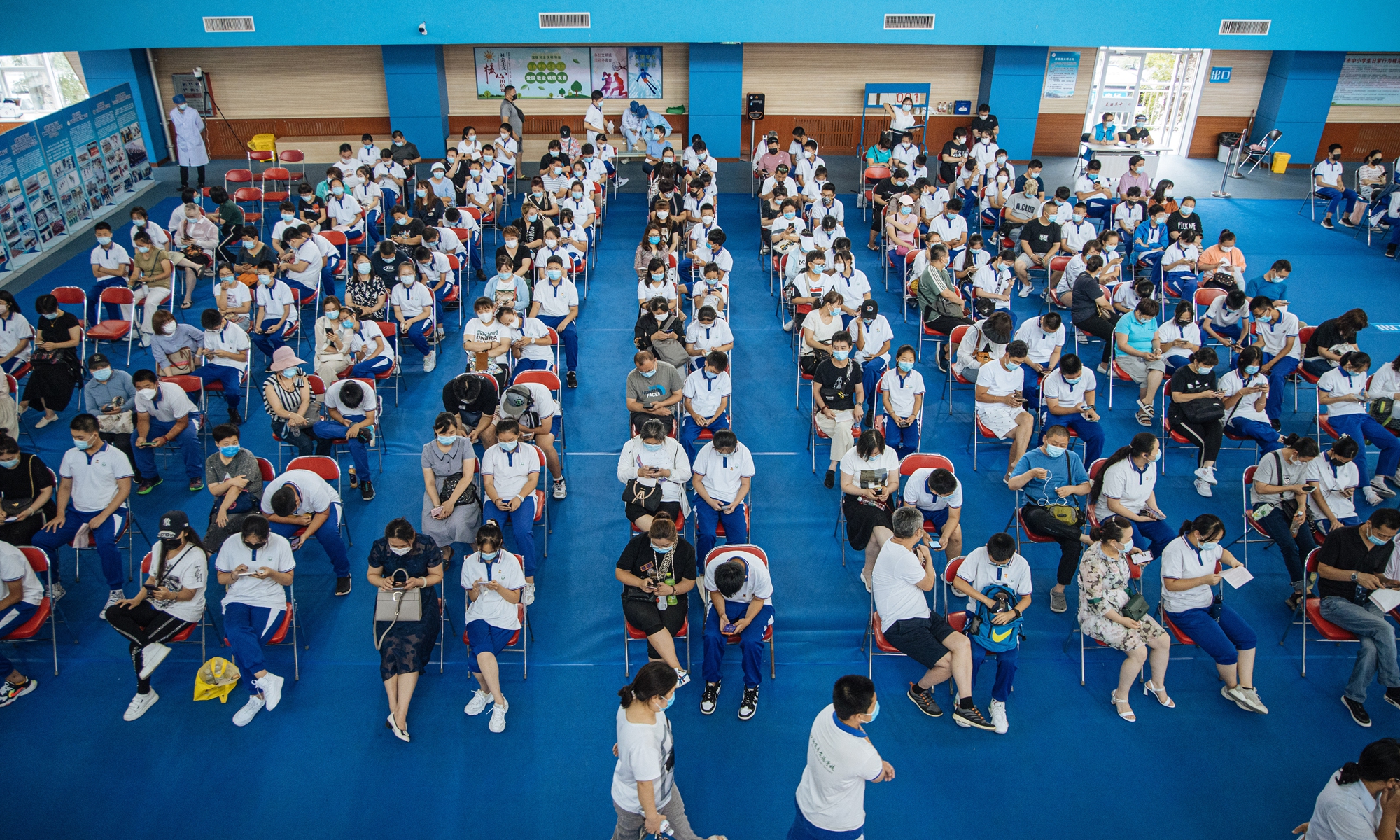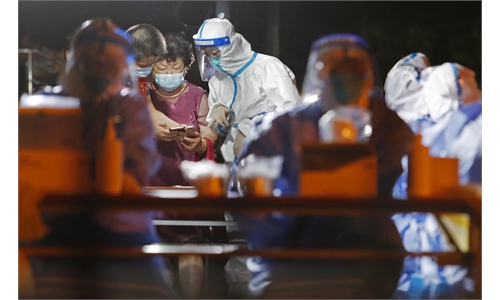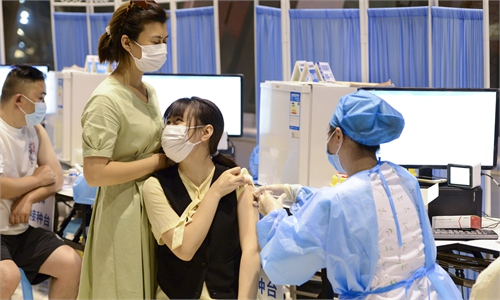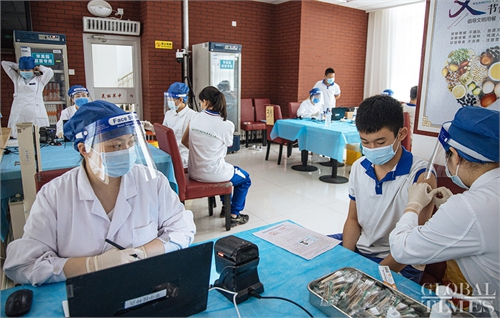China launches vaccinations for teenagers as Delta runs rampant
Campaign to soon cover children aged 3-12

Students and their parents wait for vaccinations at the inoculation center of Pingguoyuan Middle School in Shijingshan district, Beijing as the capital city is promoting COVID-19 vaccinations for those aged 12-17. Photo: Li Hao/Global Times
China has launched a vaccination campaign for minors aged 12-17 amid the fresh Nanjing COVID-19 outbreak, which has spread to at least 18 provinces, and Observers believed that improving vaccination rates for the entire population - including minors - is important to tackle the rampant Delta variant, which is far more contagious, as well as possible future new variants.
The Ministry of Education (MOE) has urged local authorities across the country to promote student vaccinations, and in a notice issued on Monday, the MOE said that education departments should immediately activate emergency response mechanisms for COVID-19.
Vaccinations should be offered to all eligible students below the age of 18, and it must be conducted with the consent of the students or their guardians, the notice said.
The MOE's notice came amid the ongoing fresh Nanjing outbreak, which has caused more than 300 infections in at least 27 cities in 18 provinces across the country. Some children were infected with COVID-19 in Nanjing, and the youngest confirmed patient was an 8-month-old baby, according to the Nanjing health authority.
Several places have rolled out vaccination campaigns for minors since late July, including North China's Tianjin Municipality, Southwest China's Chongqing Municipality and Central China's Henan Province, and students have to be accompanied by a guardian in order to get vaccinated.
A resident in Tianjin, surnamed Song, told the Global Times on Tuesday that his 15-year-old daughter was inoculated on July 28, as arranged by her school. He said he trusted the safety of the vaccines, and the girl only felt muscle soreness after the injection but was fine until now, he said.
In Beijing, a Global Times reporter visited Capital Normal University Pingguoyuan High School in Shijingshan district on Tuesday, where junior and senior high school students and their parents gathered to get vaccinated.
Students and their parents scanned health codes and had their temperatures checked before entering the campus, and then they kept a one-meter distance while queuing for the vaccination process.
The only difference between vaccination for adults and minors is that one parent has to accompany a minor and sign a consent letter for the child, according to the Shijingshan education commission.
A girl who finished vaccination said it only took around five minutes for checks of her identity and medical history and registration, and she left with her mother after a 30-minute-post-inoculation observation period.
According to the education commission of Shijingshan, the district started to inoculate senior high school students (15-17) from July 24, and junior high school students (12-14) from Monday. A total of 1,260 students were vaccinated on July 31.
Several parents interviewed by the Global Times said they will send their teenagers to get inoculated considering the fast-spreading outbreak in China, but some showed reluctance as they were not sure of the side effects or whether it's necessary for children, who usually only develop mild symptoms.
Chinese virologists and immunologists said as the Delta variant runs rampant globally, it's urgent to build an immunity barrier through mass vaccination, which is also important to avoid further mutations of the virus.
Tao Lina, a Shanghai-based vaccine expert, told the Global Times that children and teenagers are key groups for China to achieve herd immunity, and most teens do not have immunity to COVID-19, so vaccination could protect them against severe symptoms and death.
Even if most teens only develop mild symptoms, they could still infect others, especially family members, schoolmates and teachers, which may easily trigger a new outbreak. Those who don't get inoculated due to underlying diseases might develop severe symptoms, Tao said.
A Beijing-based immunologist who requested anonymity told the Global Times on Tuesday that he planned to accompany his 14-year-old daughter to get inoculated.
But he warned that young people cannot let their guard down even after vaccination, and they should maintain precautions such as wearing masks in public places, as vaccines cannot offer 100-percent protection.
Next, China's vaccination campaign will cover children aged 3-12, Tao said.
Chinaing China ireleased its trial results for minors aged 3-17 last week, saying that its inactivated vaccines had good safety, tolerability and immunogenicity in these youths.
Chinese vaccines are also starting to be used for minors in more countries. Sinopharm told the Global Times on Tuesday that the United Arab Emirates will become the first foreign country to start providing Sinopharm's COVID-19 vaccines to children aged 3-17.
Countries including Canada, the UK and the US have approved Pfizer/BioNTech's coronavirus vaccine for use in children aged 12 and above.



